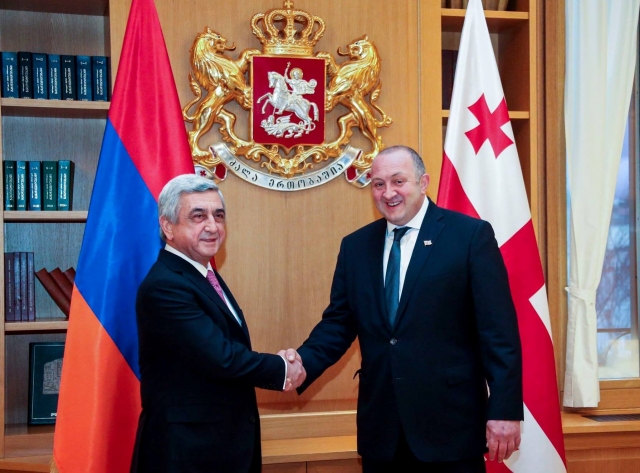Margvelashvili: Different Geopolitical Vectors of Georgia & Armenia Do Not Reduce Mutual Cooperation
Georgian President Giorgi Margvelashvili says that despite Armenia’s membership of the Eurasian Union and Georgia’s free trade agreement with the EU, the economic cooperation between the two countries has not reduced.
“On the contrary, we see that the cargo turnover has increased among our countries, as well as the tourism indicator increases annually,” he added.
The president made the statements on December 25 at the joint press-conference with his Armenian counterpart, Serzh Sargsyan at the Presidential Palace in Tbilisi.
Margvelashvili underlined that Georgia and Armenia celebrate 25 years of diplomatic cooperation.
“The visit of the President of Armenia to Georgia is another step forward, one more attempt to completely exploit the potential for the benefit of our peoples, and for deepening cooperation between the two fraternal nations,” he said.
According to Serzh Sargsyan, the South Caucasus security issues and economic directions were discussed at the meeting.
He said the existing conflicts can be solved only by peaceful means and within the framework of agreed formats.
“In all negotiations, we always try to get the documents and make statements that are not damaging the interests of Georgia. I think both Georgian and Armenian side will keep this position which is beneficial to our peoples,” the President of Armenia said.
Before making statements for the press, the presidents held face-to-face and extended meetings. They discussed bilateral political cooperation and prospects of further advancing relations between Georgia and Armenia.
Margvelashvili noted that Georgia welcomes the Comprehensive & Enhanced Partnership Agreement signed between the European Union & Armenia and considers it as a significant message from the EU to Armenia that opens up new opportunities for mutual cooperation.
He also provided his Armenian counterpart with the current situation in Georgia's occupied territories and illegal actions taken by Russia. The conversation also touched upon the importance of the non-recognition policy of Georgia’s occupied territories, as well as the Russian occupation policy of Abkhazia and the Tskhinvali region.
At the extended meeting the parties discussed economic cooperation and trade relations between Georgia and Armenia.
Evolving cooperation in trade and tourism has been underscored. According to the current data, turnover is increased by 24% and the number of visitors by 18.5%; however, to reach the full potential, the parties have agreed on concrete steps to further advance this cooperation.
The conversation also touched upon the prospects of further developing close cooperation in energy and business sectors, as well as in the areas of culture and education.
The presidents noted that Georgia-Armenia relations serve as a model for the cooperation between countries having different geopolitical vectors.
By Thea Morrison












